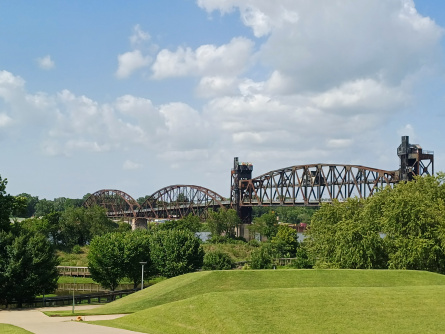
Fabienne Müller, a doctoral researcher in project B11, which deals with the historical perspective of protectionism and social policy in Argentina and the US, is currently researching the questions of her dissertation in various cities in the United States. Her work focuses on the first half of the 1990s and the policies of President Bill Clinton.
In order to be able to classify the influence of neoliberal ideas on social and trade policy at the beginning of the first term of the 42nd President, Fabienne is working in various archives and libraries during her archive trip, which lasts a total of almost three months until September 18th of this year. Last year she already had the chance as a short-term fellow at the German Historical Institute Washington D.C. to view documents and correspondence in the National Archives in Washington D.C./College Park, Maryland and in the Hagley Library in Wilmington, Delaware.
This summer, more research days followed at the National Archives and the Manuscript Reading Room at the Library of Congress. A special experience were the two weeks in July that Fabienne spent in Little Rock, Arkansas. Since the Bill Clinton Presidential Library here holds documents from his terms as president, she had the opportunity to view files from those years that had just been released. These included the files of Rahm Emanuel, a close advisor to Bill Clinton on various topics, such as the NAFTA agreement and health policy. The material in this collection includes publications, reports, memoranda, draft speeches, surveys, newspaper articles, press releases, brochures, emails, talking points and correspondence, which Fabienne was able to view.
With this material and other documents from her two archival trips, Fabienne Müller hopes to get closer to answering the question of how much neoliberalism during this period affected the two policy areas that project B11 focuses on: social and trade policy. Her current stay also allows her to get to know individual parts of the US in a unique way and people from different groups, with whom she gets to talk in her host family, in the student dormitory, at the German Historical Institute, in various hotels, museums, archives and libraries and on long train journeys. They share with her parts of everyday life in a country which is currently shaped again by tough election campaigns, and give her very personal insights into the effects of the processes that project B11 is historically investigating. This learning process is not only valuable for Fabienne's dissertation within the project, but like every trip, it is an invaluable personal experience.
Contact:
Fabienne Müller
CRC 1342: Global Dynamics of Social Policy, Institut für Geschichtswissenschaft / FB 08
Universitäts-Boulevard 13
28359 Bremen
Phone: +49 421 218-58628
E-Mail: famuelle@uni-bremen.de










